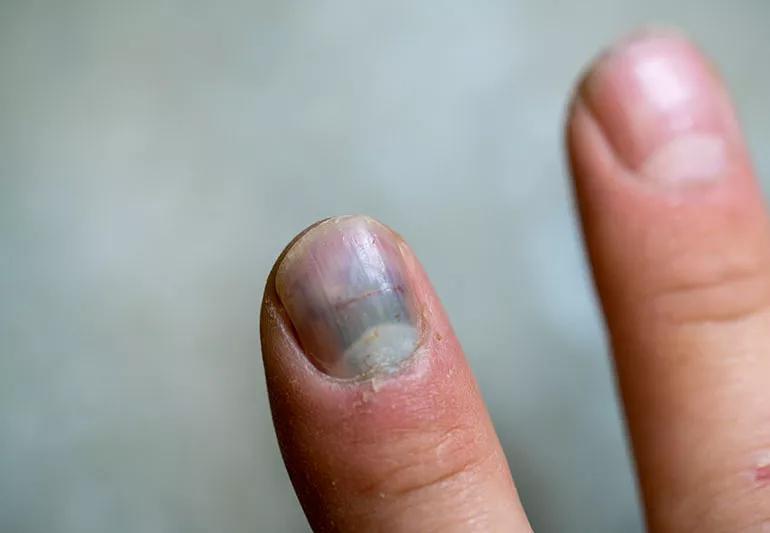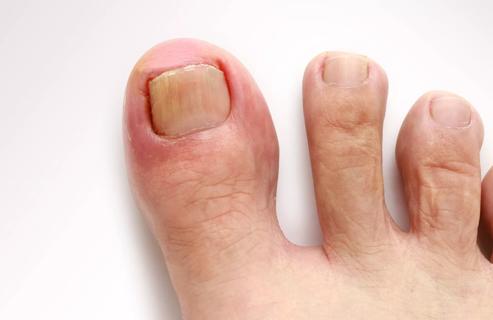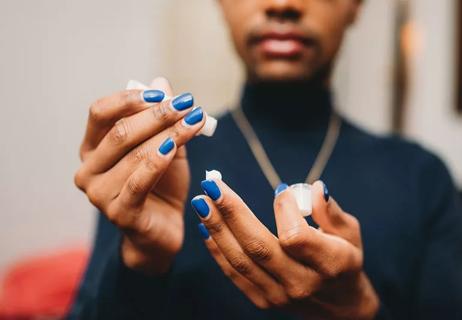Nail injuries need special care

A bruised nail is usually the result of an accident you don’t want to repeat. Most people have experienced the agony of stubbing a toe or slamming a finger in a door. A bruised nail is painful and can take months before it looks normal again. In some cases, your nail may fall off — right away or weeks later.
Advertisement
Cleveland Clinic is a non-profit academic medical center. Advertising on our site helps support our mission. We do not endorse non-Cleveland Clinic products or services. Policy
Family medicine physician Allan Capin, MD, explains how to deal with a bruised nail or a nail that’s falling off.
After a hard impact to your finger or toe, your nail may look bruised. But it’s the tissue under your nail that’s bruised — not your nail itself. Blood or bruising under your nail is known as a subungual hematoma.
If you see blood or a bruise under your nail after an injury, seek medical care soon — within two days. Although it might seem like no biggie, a nail bruise needs medical attention for several reasons.
The pain you feel from a bruised nail isn’t just from the accident. “Blood trapped under your nail puts pressure on your finger or toe nerves,” explains Dr. Capin. “That pressure can be excruciating, making it difficult to work or perform daily activities.”
And the nerve pain from trapped blood can take weeks to get better — unless your healthcare provider takes care of it right away. “We can drain the blood with trephination, a simple, painless procedure that relieves the pressure and pain quickly,” says Dr. Capin. “But if we don’t drain that blood within the first 48 hours, it clots. Clotting causes a bulk under the nail that could potentially lead to weeks of unnecessary pain.”
Advertisement
After a trephination procedure, keep your nail clean and dry. “Don’t soak your injured nail in a bath or hot tub. Avoid swimming until your provider says it’s OK,” says Dr. Capin. “This can sometimes lead to breaks in skin and an invitation for infection.”
A small bone break in your finger or toe can be hard to spot without medical tests. “Many people don’t realize their injury could result in a broken finger or toe as well. X-rays are, therefore, important,” says Dr. Capin. “If you have a large bruise under your nail, there’s a good chance you have a broken bone, also.”
Untreated fractures could heal incorrectly. “A bone that heals in the wrong position can interfere with how your finger or toe works naturally,” explains Dr. Capin. “It can also cause long-term pain.”
The nerves in your fingers and toes are important for your daily function. Nerves in your toes help you walk and stand. Nerves in your fingers are necessary for everything from picking up objects to typing. If your nerves are damaged, you could have long-term symptoms like tingling, weakness or pain.
“For minor nerve damage, you may need to rest and splint the finger or toe,” says Dr. Capin. “More complicated cases could require physical therapy or surgery. Get your injury examined right away so your healthcare provider can recommend next steps for treatment.”
Your nail matrix is the area under the base of your nail where your nail grows in a linear fashion. Damage to your nail matrix can affect nail growth. You could end up with a nail that never looks quite right again.
“An injury to the nail matrix can cause permanent nail deformity, loss of natural contour and shape,” notes Dr. Capin. “Without treatment, you could end up with a nail that has an unusual shape or a depression that never goes away.”
Even a small injury to your nail bed can undo the “glue” that holds your nail to your finger or toe. So, yes, your nail could come off after an injury — even with the right medical treatment. Or, you might have the unpleasant experience of accidentally ripping off your nail.
If you’ve ripped off all or part of your nail and it’s bleeding:
If you hurt your nail a while back and it’s coming off, don’t try to remove it yourself. “If the nail is bothering you, your healthcare provider can usually safely remove the nail,” advises Dr. Capin. “A new nail will grow in, but it will take several months.”
Advertisement
As your nail bed heals:
A nail injury can lead to infection if germs enter your body through a break in your nail or skin. And if your nail comes off, you likely have an opening on your finger or toe where an infection could start.
Some infections require antibiotics, but only your healthcare provider can tell you if you need them. Keep an eye out for signs of infection after a nail injury, including:
What if you notice discoloration or a bruise under your nail, but you don’t remember hurting it? That’s a sign you should see your healthcare provider.
“If you notice discoloration under your nail without an injury, contact your provider,” advises Dr. Capin. “Sometimes, it’s just a harmless mole or birthmark. Other times, however, nail discoloration can signal a health condition that needs treatment, including skin cancer.”
If you’ve done a number on your nail, you might be tempted to cover it up and move on. But step away from the nail polish or bandages. Without immediate care, you could wind up with serious pain or damage to your finger or toe.
Advertisement
Instead of toughing it out, see your healthcare provider or visit an urgent care facility. The right care can give you much-needed pain relief and help prevent future problems with your nail.
Advertisement
Learn more about our editorial process.
Advertisement

Lunulae are the visible part of your nail matrix and typically carry very little cause for concern

Pain meds, toenail protectors and petrolatum jelly may spare you a trip to a podiatrist

This common problem has plenty of solutions, from supplements to slugging

Bathing once a day is the general guidance, but you could also have reasons to soap up twice a day or not at all
There’s not one specific cure-all diet for eczema, but it helps to keep track of what you eat and when you experience symptoms

It’s best to avoid picking at zits, which can damage your skin (though there are ways to minimize the risk)

Both inflammatory conditions have varying triggers and symptoms

Strengthening your skin barrier, simple routines and minimizing products are ongoing, popular trends

Start having sex about 72 hours before ovulation, then at least every other day during your fertile window

Attachment theory suggests that your earliest relationships shape connections throughout your life

It isn’t a recognized mental health disorder, but research shows that problematic social media use can negatively affect your mental health, self-esteem and sleep